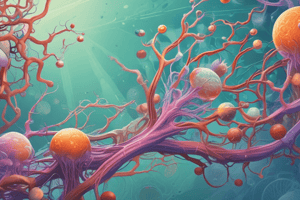Podcast
Questions and Answers
What is the primary unit of life studied in biology?
What is the primary unit of life studied in biology?
- Tissues (correct)
- Organisms (correct)
- Cells (correct)
- Molecules
Which branch of biology focuses on the inheritance and variation of traits?
Which branch of biology focuses on the inheritance and variation of traits?
- Genetics (correct)
- Ecology
- Molecular Biology (correct)
- Evolutionary Biology (correct)
What process allows plants to convert light energy into chemical energy?
What process allows plants to convert light energy into chemical energy?
- Photosynthesis (correct)
- Respiration
- Transpiration
- Fermentation
What is the term for the process by which populations change genetically over time?
What is the term for the process by which populations change genetically over time?
Which of the following is a mechanism of evolution that involves survival and reproduction?
Which of the following is a mechanism of evolution that involves survival and reproduction?
What maintains a stable internal environment within an organism?
What maintains a stable internal environment within an organism?
Which branch of biology studies microscopic organisms such as bacteria and viruses?
Which branch of biology studies microscopic organisms such as bacteria and viruses?
What is the key structural molecule carrying genetic information in organisms?
What is the key structural molecule carrying genetic information in organisms?
What is the primary purpose of cellular respiration in organisms?
What is the primary purpose of cellular respiration in organisms?
Which of the following is NOT a stage in the scientific method?
Which of the following is NOT a stage in the scientific method?
Why is biodiversity important for ecosystems?
Why is biodiversity important for ecosystems?
What does understanding biology improve?
What does understanding biology improve?
What characterizes the scientific process?
What characterizes the scientific process?
Flashcards
Biology Definition
Biology Definition
The scientific study of life and living organisms.
Cell Theory
Cell Theory
All living things are made of cells, cells are the basic units of life, and all cells come from other cells.
Homeostasis
Homeostasis
Maintaining a stable internal environment in an organism.
Metabolism
Metabolism
Signup and view all the flashcards
Evolution
Evolution
Signup and view all the flashcards
Natural Selection
Natural Selection
Signup and view all the flashcards
Adaptation
Adaptation
Signup and view all the flashcards
DNA
DNA
Signup and view all the flashcards
Cellular Respiration
Cellular Respiration
Signup and view all the flashcards
Scientific Method
Scientific Method
Signup and view all the flashcards
Biodiversity
Biodiversity
Signup and view all the flashcards
How does biology impact our lives?
How does biology impact our lives?
Signup and view all the flashcards
What makes the scientific process cyclical?
What makes the scientific process cyclical?
Signup and view all the flashcards
Study Notes
Introduction to Biology
- Biology is the scientific study of life and living organisms.
- It encompasses a vast range of topics, from the molecular level to the ecosystems of the planet.
- Key areas of study include cells, genetics, evolution, ecology, and the diversity of life.
Branches of Biology
- Molecular Biology: Focuses on the structure and function of biological molecules like DNA, RNA, and proteins.
- Cell Biology: Studies the structure and function of cells, the basic units of life.
- Genetics: Investigates inheritance and variation of traits through genes.
- Evolutionary Biology: Explains the mechanisms of species change over time and the relatedness of different organisms.
- Ecology: Examines interactions between organisms and their environment.
- Physiological Biology: Explores the processes that allow organisms to survive and adapt.
- Biochemistry: Studies the chemical processes in living organisms.
- Zoology: The study of animals.
- Botany: The study of plants.
- Microbiology: Focuses on microscopic organisms like bacteria, viruses, and fungi.
- Paleontology: Studies fossils to understand past life forms and their evolution.
- Developmental Biology: Explains the processes by which organisms grow and develop, from fertilization through adulthood.
Key Concepts in Biology
- Cell Theory: All living things are composed of cells; the cell is the basic unit of life; all cells come from pre-existing cells.
- Homeostasis: The maintenance of a relatively stable internal environment in an organism.
- Metabolism: The sum of all chemical reactions that occur in an organism.
- Evolution: The process by which populations of organisms change genetically over time. This is driven by mechanisms like natural selection. Key to evolution is the concept of adaptation, where traits advantageous in an environment become more common.
- Adaptation: A trait that enhances an organism's survival and reproduction in its environment.
- Natural Selection: A mechanism of evolution where individuals with advantageous traits are more likely to survive and reproduce, passing those traits to their offspring.
- DNA: The molecule carrying the genetic information of an organism.
- Genes: Segments of DNA that code for specific proteins, which carry out numerous functions in the organism.
- Photosynthesis: The process by which plants convert light energy into chemical energy in the form of sugars.
- Cellular Respiration: The process by which organisms release energy from food, often using oxygen.
The Scientific Method
- Scientists use a systematic approach for investigating biological phenomena.
- This often involves:
- Observation
- Hypothesis formation
- Experimentation
- Data analysis
- Conclusion
- This approach is fundamental for developing new scientific understanding and addressing questions in biology.
Biodiversity
- The variety of life on Earth, encompassing genetic diversity, species diversity, and ecosystem diversity.
- This diversity is critical for the stability and functioning of ecosystems.
Significance of Biology
- Understanding biology is crucial for addressing pressing global issues.
- This includes disease prevention and treatment, sustainable agriculture, conservation efforts, and more.
- Advancement in biology improves our quality of life.
The Scientific Process
- The scientific process is a cyclical process, meaning that a new discovery may lead to new questions and a reiteration of the stages of the process.
- This iterative nature of science is what allows for continuing growth in scientific knowledge.
Studying That Suits You
Use AI to generate personalized quizzes and flashcards to suit your learning preferences.




